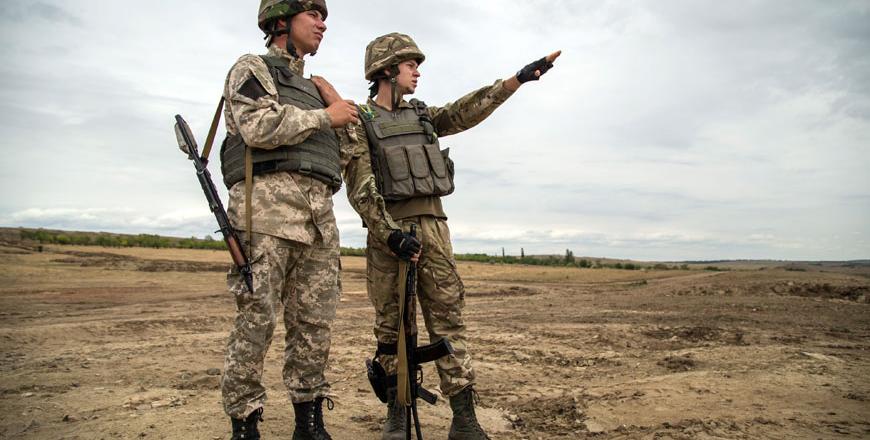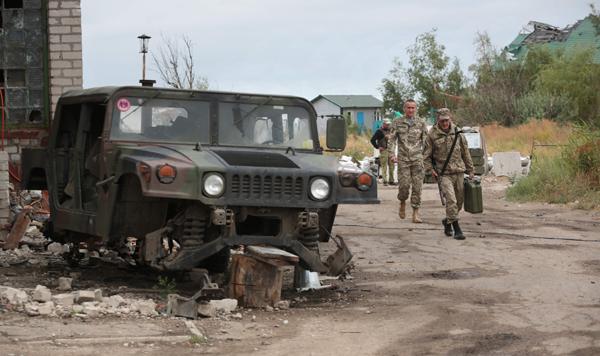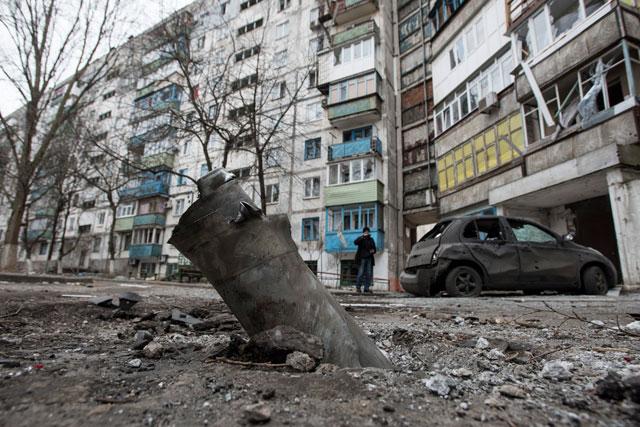You are here
Ukraine, Russia trade blame for sharp violence spike
By AFP - Aug 18,2015 - Last updated at Aug 18,2015

Ukrainian servicemen stand on the position of Ukrainian forces near Popasna, in the Donetsk region, on Tuesday (AFP photo)
KIEV — Ukraine's pro-Western leadership and Russia traded blame on Tuesday for a sharp escalation in violence that threatened to see all-out warfare return to the former Soviet nation's separatist east.
Kiev and the insurgents on Monday reported the deaths of at lest 10 soldiers and civilians — a dramatic escalation that sparked international condemnation and marked the worst bloodshed in more than a month.
Russian President Vladimir Putin pinned the upsurge on alleged preparations by Kiev to grab back territories it had lost in the course of the 16-month war.
"Unfortunately, we are now witnessing an escalation whose blame lies not on the rebels but on their foes," Russian news agencies quoted Putin as saying.
"I hope that things will not lead to large-scale violence."
But Ukrainian army spokesman Vladyslav Seleznyov accused "Russia of trying to pile additional pressure on Ukraine."
"This once again proves that the [insurgents] are not looking for a peaceful way out of this conflict," he told reporters in Kiev.
The Ukrainian army on Tuesday reported the death of one serviceman and the injury of another in the Russian-speaking provinces of Lugansk and Donetsk.
But the military also noted a "sharp drop-off in the number of provocative attacks on Ukrainian positions".
Some separatist offensives have previously been halted by strong Western criticism of Russia — an increasingly isolated giant that faces the threat of even stronger Western sanctions for its alleged support of most rebel campaigns.
Moscow denies the charges and in turn accuses Washington of orchestrating the February 2014 ouster of a Moscow-backed president of Ukraine that sparked the current conflict.
Monday's clashes were the culmination of days of restlessness in the former Soviet nation that saw the number of rocket and heavy artillery fire exchanges climb to levels not recorded since the signing of a very loosely observed February armistice.
The militias have been trying to seize a road linking their de facto capital Donetsk with Mariupol, a southeastern port held by the government and responsible for exporting much of the industrial region's factory output.
Mariupol also provides a land bridge between eastern rebel territories and the Crimea peninsula that Russia seized from Ukraine in March 2014.
But Monday's deaths came from strikes across the warzone.
France said Ukrainian President Petro Poroshenko would travel to Berlin on Monday to discuss the latest spike in violence with German Chancellor Angela Merkel and French President Francois Hollande — the West's main sponsors of the February accord.
Some analysts in Kiev saw Putin's exclusion from the meeting as a diplomatic snub.
The violence has sparked a new diplomatic flareup between Moscow and Western powers who want to prop up Kiev's new pro-European leaders against what they view as Russian aggression.
"There can be no mistake as to who is responsible — Russia and the separatists are launching these attacks, just as they escalated the conflict last August," US State Department spokesman John Kirby told reporters.
He appeared to be referring to Ukraine's loss of hundreds of soldiers who were surrounded by a far more heavily-armed militia unit in the east a year ago.
Russia's foreign ministry denounced Kirby's comments as "the US State Department's effective approval of the Ukrainian army's attacks on rebel positions".
Some Kiev politicians accuse Moscow of planning a new rebel offensive that could rattle the Ukrainian leadership enough to reverse its plans to implement a landmark trade treaty with the European Union at the start of next year.
Russia has already threatened to expand its list of banned Ukrainian food imports should the agreement go into effect.
Yet Poroshenko said on Monday that he and EU Commission President Jean-Claude Juncker had agreed by telephone that the "free trade zone should be strengthened as of January 1".
The United Nations believes the conflict — Europe's deadliest since the 1990s wars in the Balkans — has killed more than 6,800 people and driven 1.4 million from their homes.
Related Articles
KIEV — Ukraine on Thursday reported the heaviest rebel shelling attack in the separatist east for a year in what the president said could be
Ukraine President Petro Poroshenko made a personal plea to Russia's Vladimir Putin and Washington threatened tougher measures Wednesday should Moscow fail to rein in separatists mounting a new offensive in the east of the ex-Soviet republic.
US President Barack Obama vowed Sunday to ramp up pressure on Russia after a rocket barrage blamed on Kremlin-backed Ukrainian rebels killed 30 and threatened to open new front in the war.














